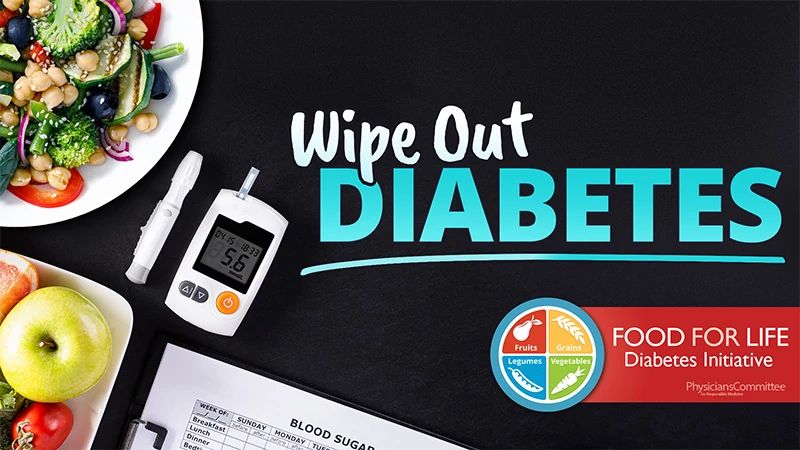‘Wipe Out Diabetes’ Food for Life Plant-Based Nutrition and Cooking Class Program Launches for National Diabetes Month

WASHINGTON, D.C.—November is National Diabetes Month, and the Food for Life plant-based nutrition and cooking class program is launching Wipe Out Diabetes to help people prevent, improve, and, in some cases, reverse type 2 diabetes with a plant-based diet rich in fruits, vegetables, grains, and beans.
More than 38 million Americans have diabetes, 97.6 million have prediabetes, and 1.2 million are diagnosed with diabetes every year, according to the American Diabetes Association. Diabetes disproportionately impacts Native Americans, African Americans, and Hispanic Americans.
But decades of research show that a plant-based diet is beneficial against diabetes. The Adventist Health Study 2, which looked at nearly 61,000 people, found that the incidence of diabetes was 2.9% in those consuming a vegan diet compared with 7.6% in nonvegetarians.
Years of clinical research by the Physicians Committee for Responsible Medicine has also put a plant-based diet to the test in people with type 2 diabetes. In one study, 99 individuals were randomized to follow either a low-fat, plant-based diet or the American Diabetes Association’s recommended diet for 22 weeks. Forty-three percent of the vegan group were able to reduce their diabetes medications compared with 26% of the ADA group. And those following a vegan diet had significantly greater improvements in body weight, HbA1c, and LDL cholesterol.
Before taking a Food for Life class series, Stephanie Goettge hadn’t been watching the fat in her diet and was eating a lot of processed foods rather than fruits, vegetables, grains, and beans. She was struggling with type 2 diabetes and had an A1C of 11%. A1C is a measurement of a person’s average blood sugar levels over the past three months. A normal A1C is below 5.7%, prediabetes levels are between 5.7% and 6.4%, and 6.5% or above indicates diabetes.
“The real game changer came about three weeks after I started the Food for Life classes,” Stephanie recalls. “Instead of those scary spikes over 140, my glucose levels were staying under 100. That's when it really hit me—I was actually reversing my type 2 diabetes! Just by changing what was on my plate, I was rewriting my health story.”
Six months after starting the class, Stephanie had reversed her diabetes, bringing her A1C all the way down to a healthy 5.2%. Her cholesterol levels also came down, her blood pressure is normal, she is no longer obese, and her energy levels are “through the roof.”
She says the key to her success was getting the proper nutrition education from Food for Life classes taught by instructors Jill and Joel Erickson. Designed by physicians, nurses, and dietitians, Food for Life classes promote healthful plant-based eating based on the latest scientific research. Each class includes information about how certain foods and nutrients work to promote or discourage disease, cooking demonstrations of delicious and healthful plant-based recipes, and practical cooking skills and tips for incorporating healthful eating habits into daily life.
“Stephanie’s success at defeating her type 2 diabetes and improving her health, shows not only the healing power of a plant-based diet based on fruits, vegetables, grains, and beans,” says Food for Life instructor Jill Erickson. “It also shows the power of the Food for Life program’s education and support in helping class participants achieve lifesaving health goals.”
If you want to learn more about how a plant-based diet can help improve diabetes and other health conditions for you or someone you know, please visit Food for Life to find class near you.
Founded in 1985, the Physicians Committee for Responsible Medicine is a nonprofit organization that promotes preventive medicine, conducts clinical research, and encourages higher standards for ethics and effectiveness in education and research.







